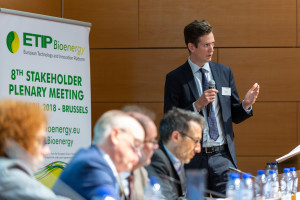
First of all, I would like to express my gratitude for the confidence entrusted in me as the new Chair of ETIP Bioenergy Steering Committee. I really look forward to working within bioenergy industry and I am eager to collaborate with other stakeholders to unlock the entire potential for bioenergy. If we join our forces and focus our efforts I believe that we can achieve important goals together. As we all strive for a sustainable society to come true, we must consider the transportation sector as well. A sustainable transport system cannot be contemplated without taking into account the issue of sustainability of energy supply. To this purpose, we absolutely cannot disregard bioenergy.
Bioenergy in transport has an enormous potential whereas a level playing field and coherent policy frameworks are applied. Furthermore, as EU continues to address the creation of an Energy Union with secure, affordable and climate- friendly energy measures, bioenergy will play a key role. Today many available technologies can deliver sustainable fuels to the market. In addition, there are several technologies at the top of the TRL scale that are close to commercialization and other that still have some way to go to be proven viable. I believe that we can bring these technologies to market, given a sound political framework coordinated with research and innovation. We need a “sense of urgency” in order to push development forward. Sometimes we need to remind ourselves the reasons behind our actions even though it might seem obvious: our task is to radically change the way we use energy for transport. To proceed from a system that relies on fossil energy to one that is in balance with nature: that is not an easy task, but we all must roll up our sleeves to make it happen as soon as possible. In addition to introducing new fuels, we have to remember that we also need to reduce consumption, but that is a matter for a separate talk.
Biofuels are often criticized and generalized in the current public debate and as human beings we tend to find new solutions as soon as we find the current ones complicated. That is somewhat the case of electromobility: I totally believe in it, but I do not think it will make biofuels unnecessary. In my opinion, we should rather look for a synergy by a combination of their positive features. Speaking of decarbonizing transport, we should focus on alternatives instead of exacerbating internal competition: each technology should stand on its own merits, given a level playing field voted to transparency.
Some of the criticism on biofuels is correct since they come from many different sources, but I believe that we can overcome this problem with a clear sustainability criteria framework.
As the transport system is dominated by inertia, we need to leave the wait-and-see attitude and to take action. I am very optimistic about what we can achieve within the European Union. In order to succeed, we should go forward by developing research and innovation throughout the value chain as well as to explore new horizons by questioning ourselves and challenging the current state of affairs.
This article is by Patrik Klintbom, Chair of ETIP Bioenergy Steering Committee.


